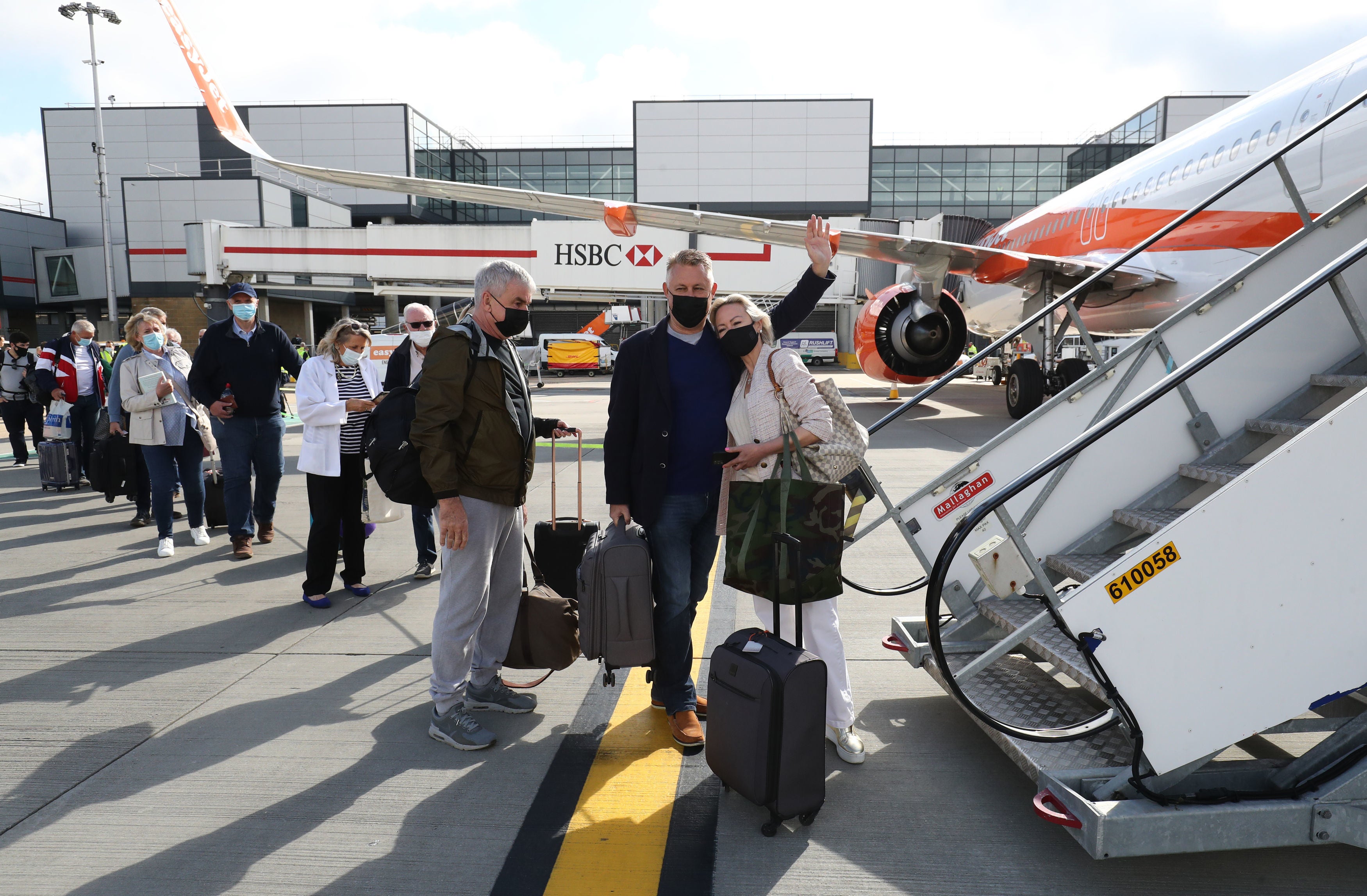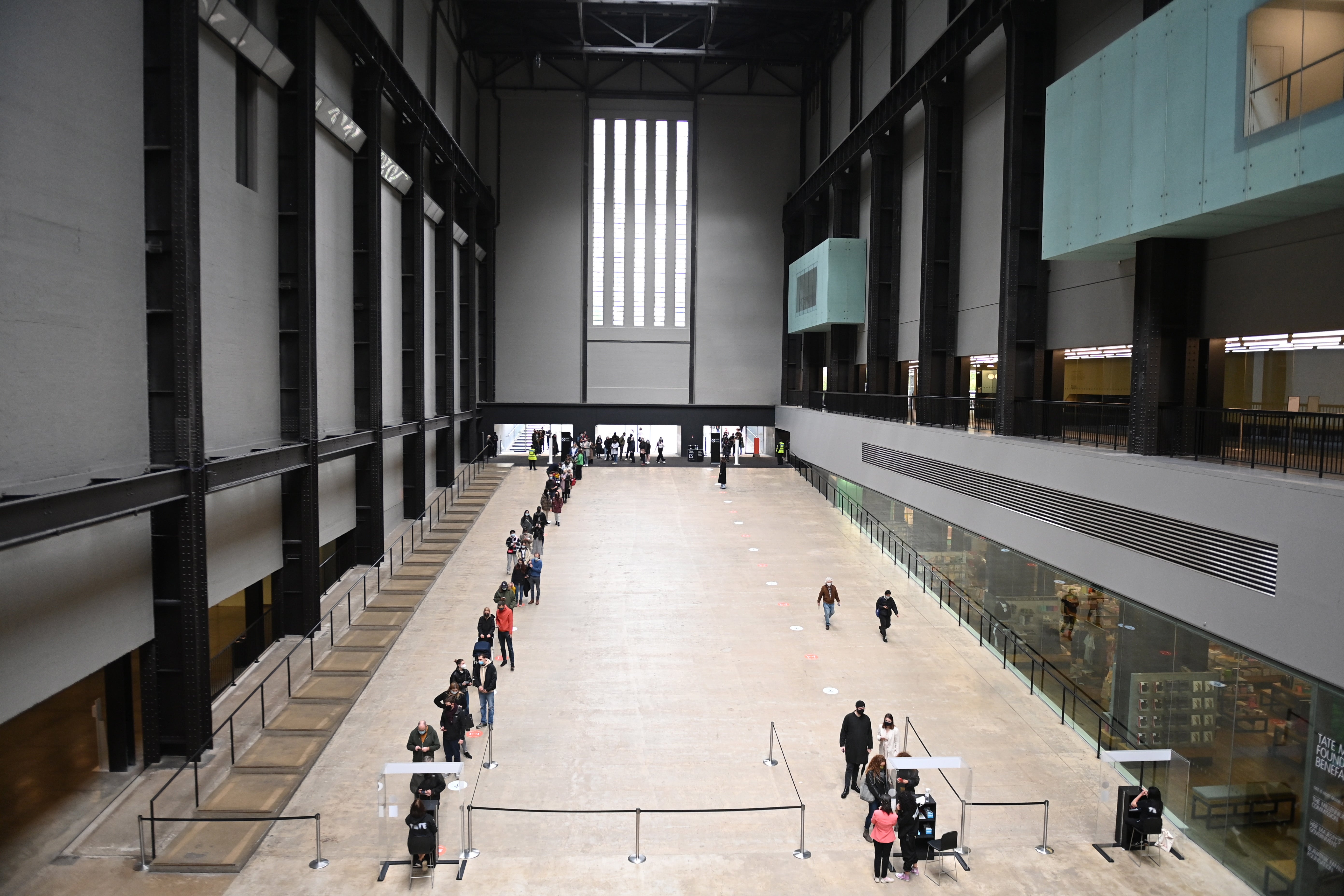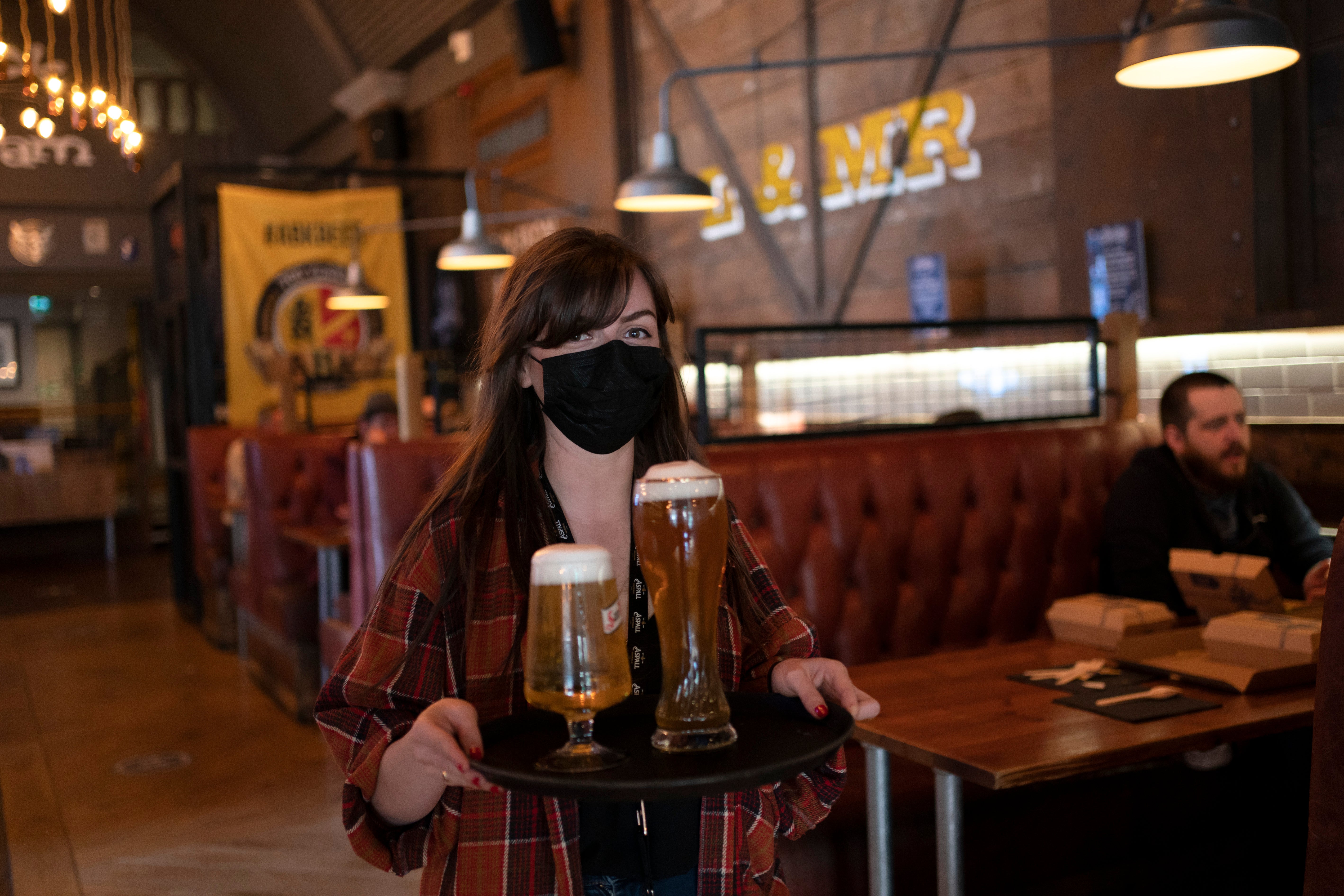Hugging and holidays resume for millions after ‘long, cold winter’ as Covid restrictions ease
Swathes of economy reopen as country enters third stage of roadmap for relaxing coronavirus rules
Your support helps us to tell the story
From reproductive rights to climate change to Big Tech, The Independent is on the ground when the story is developing. Whether it's investigating the financials of Elon Musk's pro-Trump PAC or producing our latest documentary, 'The A Word', which shines a light on the American women fighting for reproductive rights, we know how important it is to parse out the facts from the messaging.
At such a critical moment in US history, we need reporters on the ground. Your donation allows us to keep sending journalists to speak to both sides of the story.
The Independent is trusted by Americans across the entire political spectrum. And unlike many other quality news outlets, we choose not to lock Americans out of our reporting and analysis with paywalls. We believe quality journalism should be available to everyone, paid for by those who can afford it.
Your support makes all the difference.The UK took a major step out of coronavirus lockdown on Monday as pubs and restaurants reopened to indoor diners and drinkers, and holidaymakers took their first trips abroad.
Cinemas, museums, galleries and theatres welcomed back customers despite mounting concerns over the spread of an Indian coronavirus variant. And friends and family were also able to hug for the first time in months as the country enters the third stage of its roadmap for easing coronavirus restrictions.
However, Boris Johnson and health experts urged people to remain cautious despite their restored freedom. Hugs should be restrained, he said last week.
The prime minister urged the public to treat the latest easing of restrictions with a “heavy dose of caution” while Kwasi Kwarteng, the business secretary, warned against excessive drinking for those returning to bars.
From one minute past midnight on Monday, the “stay in the UK” restriction was lifted, people in England could meet outdoors in groups of up to 30, and indoors in groups of six, or two households, and indoor attractions were permitted to reopen.
For Kevin and Pauline Nash from Essex, who were on the first flight out of the UK to Faro in Portugal, which is on the green list of countries exempting them from having to quarantine on their return provided they take one post-arrival test, Monday heralded the end of a “long, cold winter”.
“We're very excited to go on holiday, we haven't been since last September,” said Mr Nash. ”It's the first flight out, so we're delighted – and it's been a long, cold winter at home so we're looking forward to it.“

Restaurant manager Amanda Brown said she ”can't wait“ to be reunited with her boyfriend, who lives in Faro, after eight months apart and six flight cancellations, as she boarded her flight from Gatwick airport.
While queuing for the plane, she said: ”I booked this holiday in December but it has cancelled probably about six times now, so this is the first opportunity I've got to fly out.
“I'm so excited – I didn't sleep properly last night – so yeah it's amazing, I love it – it's really good to see everything going back to some kind of normality.”
Thousands of passengers are due to fly to the handful of green list countries this week as tourism bosses called on the government to add more destinations to the list.
Some cruises will also resume this week with the maiden voyage of MSC’s Virtuosa ship set to take place around the coast of the UK.
There was excitement too in visitor attractions closer to home. Staff said it felt like Christmas when they welcomed visitors back to the Great North Museum in Newcastle.
The museum was filled with toddlers, accompanied by parents and grandparents, able to see its exhibits for the first time in months. Visitor numbers were limited with a ticketing system and there was a one-way system for them to follow.
At the Tate Modern on London’s South Bank, long queues formed with visitors eager to make the most of the capital’s cultural attractions that have been shuttered for months.

For the producers of The Mousetrap, the world's longest running play which reopened in the West End on Monday, the sellout opening run was proof there was still strong demand for theatre seats.
Following the easing of coronavirus restrictions the show will be put on in front of an audience for the first time since the pandemic closed theatres in March 2020.
However capacity inside St Martin's Theatre has been reduced by more than half of its usual limit of 550.
Producer Adam Spiegel said it was financially unsustainable for the theatre to continue to put the show on “long-term” with the reduced capacity. “We can do it for a while but I hope that while isn't too long,” he said.
Elsewhere in the capital, the founder of the Prince Charles Cinema said his venue would have to operate at close to its maximum capacity in order to continue to break even after coronavirus restrictions were eased.
Ben Freedman said the Soho venue had “arrived in one piece, slightly bruised but raring to go” as it reopened to the public, and had sold nearly all the available tickets for the eight films showing on its first day of being back open.

There was also a welcome change for care home residents in England who can receive indoor visits from more loved ones and leave the home for more trips from Monday.
The number of designated visitors has increased from two to five per resident, and residents can leave the home for a greater variety of activities without needing to self-isolate for 14 days on their return.
Elsewhere, some students in England began returning to campus for in-person lessons after months of remote learning, although for many classes had already finished for the year.
All remaining university students are now allowed to travel back to their term-time accommodation and take part in face-to-face activities on campus as restrictions are being eased across England.
Monday also saw pubs, bars, restaurants and cafes in Wales begin to offer indoor service for the first time since December as the country moved into alert level two. Up to six people from up to six households, not including children under 11, are able to book and sit at a table with each other.
Entertainment venues like cinemas and theatres are also able to reopen and can sell food and drink as long as it is consumed in a seated area for watching a performance.
In most of Scotland, six people from three households will be able to meet indoors, the same number can meet in a hospitality venue, and eight people from eight houses can meet outdoors. But Glasgow and Moray will remain under level three of the five-tier system, meaning pubs cannot serve alcohol indoors.
Although ministers believe that vaccines will be effective against the highly transmissible Indian variant of concern, there are worries about the impact of its spread on those who have refused to have a jab or not yet been offered one.
Professor Peter Openshaw, a member of the New and Emerging Respiratory Virus Threats Advisory Group (Nervtag), urged people to be cautious, even if they had been vaccinated.
“If you are going to be in an enclosed space, you must wear a really well-fitting mask, you must wash your hands and maybe travel with some hand sanitiser and do everything you can to reduce the likelihood of you being infected, even if you're vaccinated,” he said.
Prof Openshaw, a professor of experimental medicine at Imperial College London, also described hugging as a “high-risk procedure” and said he would “certainly not be embracing people closely”.
“I think you can greet people perfectly well at a distance with a smile and a kind word,” he added.
Additional reporting by PA
Join our commenting forum
Join thought-provoking conversations, follow other Independent readers and see their replies
0Comments